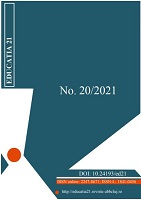Teaching Facilitators' Perceptions of the Contribution of Three Internship Workshops Models
Teaching Facilitators' Perceptions of the Contribution of Three Internship Workshops Models
Author(s): Vered Freedman, Constantin CucoşSubject(s): Education, Distance learning / e-learning, Pedagogy
Published by: Universitatea Babeş-Bolyai
Keywords: Internship workshops; online model; 'incubator' model; facilitator; learning environment;
Summary/Abstract: Internship workshops as part of induction to teaching in teacher education in Israel consist of three models: face-to-face, online, and 'incubator'. The article examines workshop facilitators' perceptions of workshops' contribution. Mixed methods research included a questionnaire completed by 101 facilitators and statistically analyzed. Interviews were conducted with nine facilitators, three from each model and content and discourse analyzed. According to quantitative findings, no significant difference between workshop models and emotional support was perceived as stronger than professional support in all three models. Interview findings showed the clear presence of both emotional support and enhancement of a sense of self-efficacy. There were noticeable unique contributions in the two newer online and 'incubator' models, compared to the traditional face-to-face model implemented at the college. Both models promoted self-efficacy and emotional support, but each one relied on different strategies to provide the two types of contribution. In the online model, use of writing and connection with the facilitator promoted the contribution. In the 'incubator' model characteristics of the environment provided conditions for advancing support. The unique contributions have practical implications - workshops should integrate online and community-based components to promote interns' sense of well-being and professional competence as future teachers. These findings may add valuable knowledge, which may help policy makers and interns themselves, to make better decisions on integrating the internship workshops within the prosses of teacher education.
Journal: Educatia 21
- Issue Year: 2021
- Issue No: 20
- Page Range: 15-23
- Page Count: 9
- Language: English

